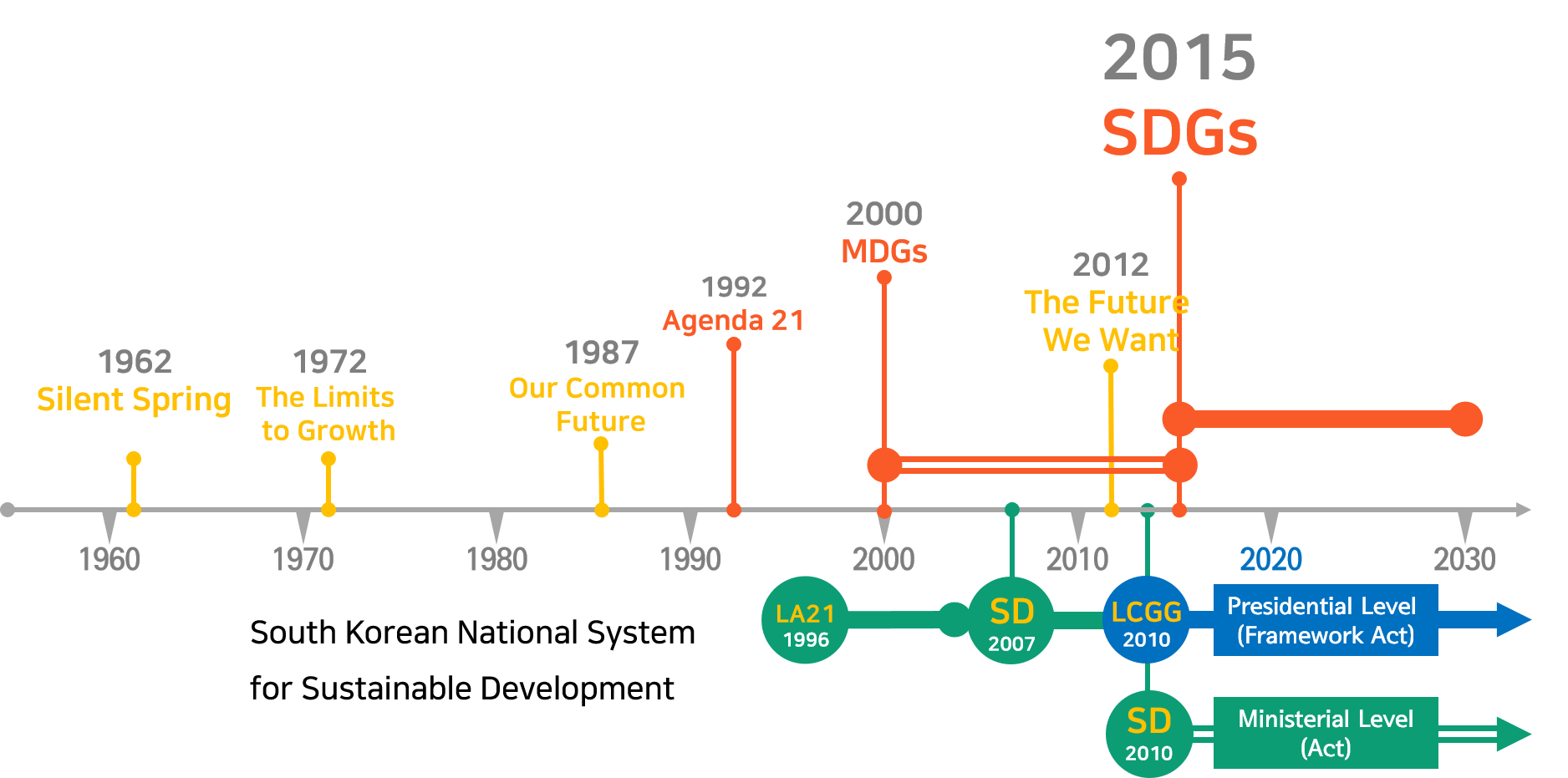
Sustainable Development has long been inspiring South Korean citizens who are thirsty for peace and justice(SDG17). Let's catch up on what is going on in South Korea, where "Green New Deal" is frequently heard.
In South Korea, the local sustainability movement has a long history back to when the Local Agenda 21 movement started in Busan in 1995, three years after when the Agenda 21 and Local Agenda 21 were born in Rio Summit in 1992. The movement got impetus from the establishment of the Presidential Commission on Sustainable Development in 2000 and the enactment of the Framework Act on Sustainable Development in 2007. According to the Act, Sub-national and Metropolitan governments got an obligation to establish a respective Council for Sustainable Development and to develop a Sustainable Development Strategy and Plan of their own.
In 2008, however, the South Korean national government proclaimed a national vision of “Low Carbon, Green Growth,” which got international praise but had the domestic institutions of sustainable development disordered. The newly-established Framework Act on Low Carbon, Green Growth(LCGG*) enforced in 2010, which dragged down the Framework Act on Sustainable Development from the presidential level to ministerial level (MoE). The controversy started here as Sustainable Development Acts(SD*) placed below the national vision of “Low Carbon, Green Growth,” which focuses merely on the economic and environmental aspects out of three main pillars of Sustainable Development, Economy, Environment, and Society. Having a Low Carbon, Green Growth strategy as one of the premier measures for sustainable development would be more rational.

South Korean National System for Sustainable Development and Low Carbon Green Growth
(Credit: ICLEI Korea Office)
Despite the decade of efforts of various civic groups, including governance bodies for local agenda 21 on restoring the current ministry level of Act on Sustainable Development to Presidential or Prime-minister level, the Framework Act on Low Carbon Green Growth is still ruling over the Sustainable Development Act in South Korea. And that means South Korean are exposed to the risk of missing the proper attention to societal sustainability in national level vision and institutional framework.
In this controversial meantime, the Ministry of Environment struggles to play a role in the control-tower of national sustainable development. Korean Ministry of Environment had drawn Korea National Sustainable Development Goals (hereafter K-SDGs) to ensure sustainability overall government sectors, which officially recognized at the cabinet meeting on December 24th, 2018, in succession to the 3rd Master Plans for Sustainable Development. Under the vision of “A Sustainable Nation Embracing All,” 5 strategies, along with 17 goals and 122 targets, have been established. Participated by more than 90 civic groups, 192 private sector experts, and 23 government branches, the entire process of drawing K-SDGs had run on the fundamental philosophy of inclusiveness and multi-governance. Despite being mentioned and highlighted with a crucial role in achieving the global goals, however, local governments in South Korea have not adequately involved in the process.
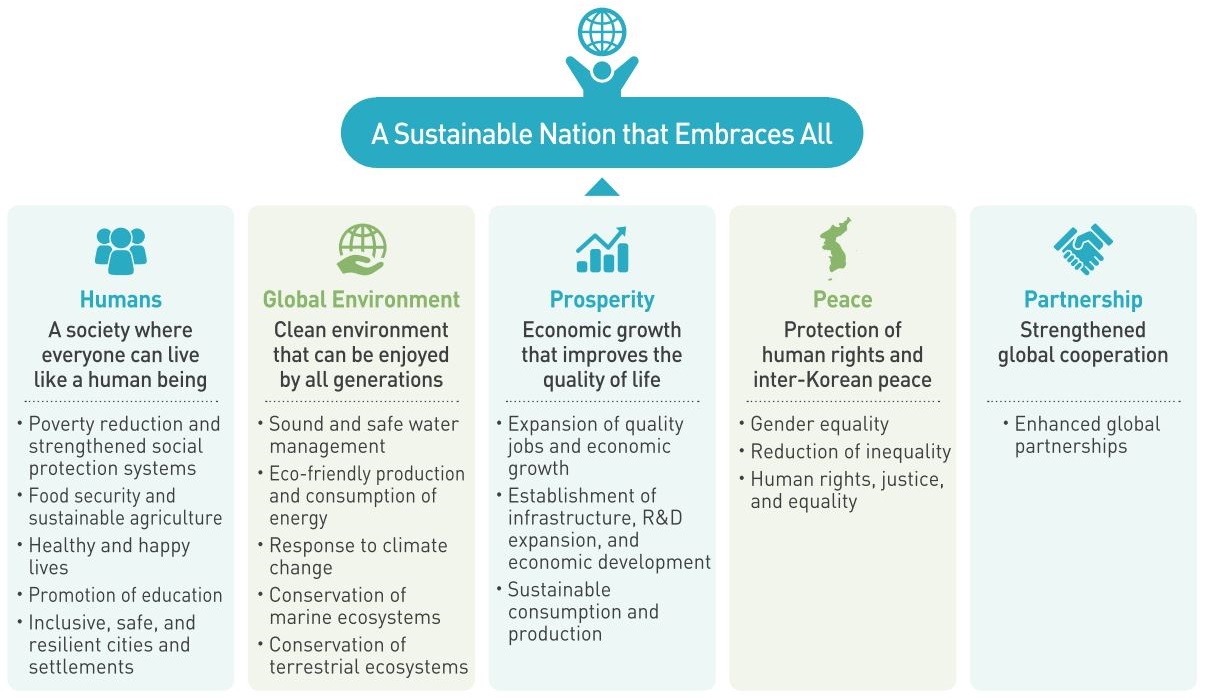
Five Strategies of K-SDGs
(Credit: Ministry of Environment of South Korea)
Since 2019, MoEK has been sharpening the targets and indicators of K-SDGs while supporting the local governments to develop the respective Localized SDGs (so-called L-SDGs) under the guidance and consultation supported by National government. As shown in table 1, So far, 5 sub-national & Metropolitan level governments and 14 local & municipal level governments have developed L-SDGs of their own and proclaimed their concrete vision and will for sustainable development from a local level. Each L-SDGs are unique and fully developed in the reflection of local context and closely linked to the national goals (K-SDGs) and eventually to the global goals (UN SDGs).
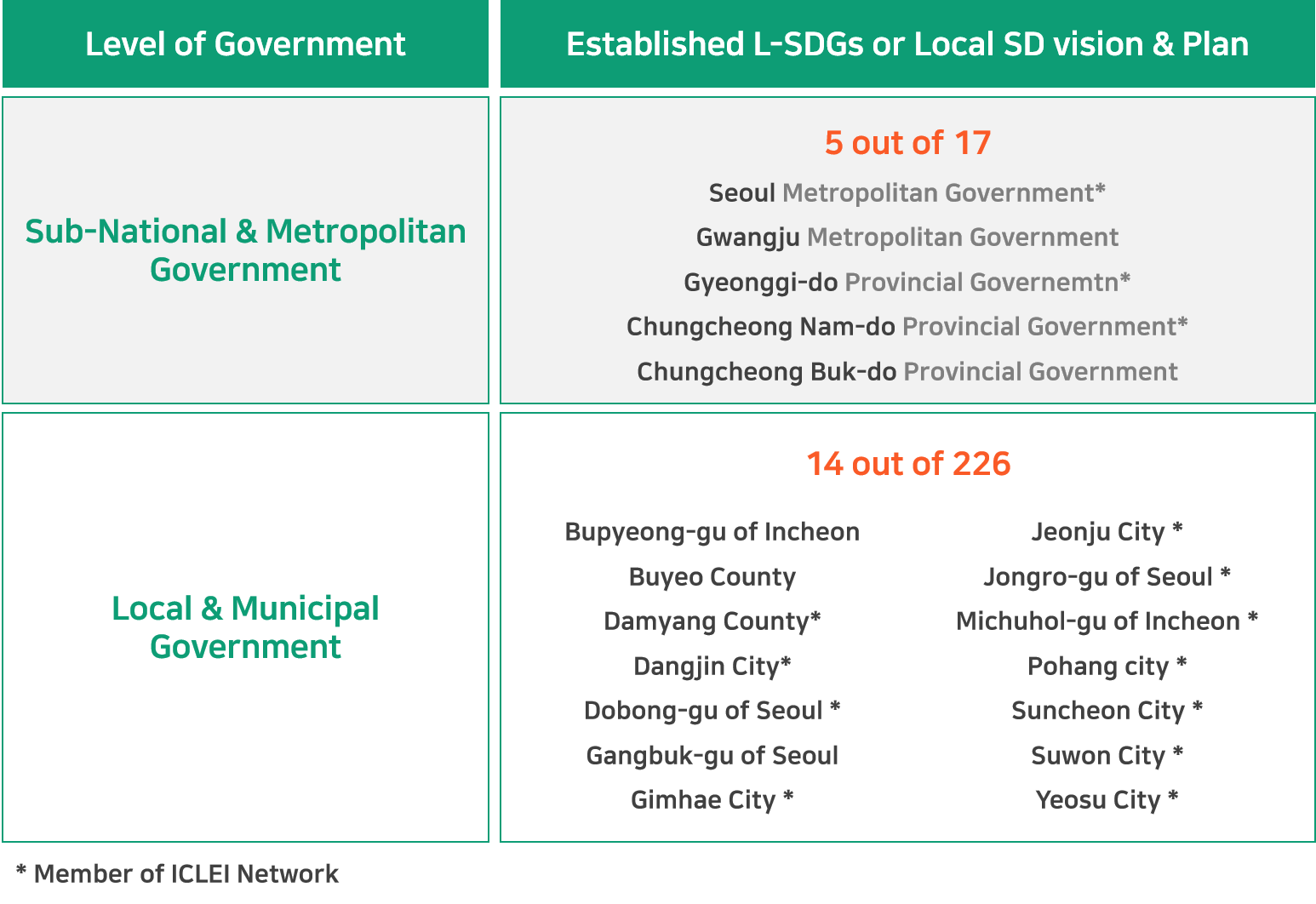
List of South Korean Cities and Provinces established L-SDGs
(Credit: ICLEI Korea Office)
Dangjin City (ChungNam-do Province) experienced unprecedented economic growth by hosting heavy industry companies and coal-powered generation facilities in the region. Citizens got wealth and higher incomes but suffered from the consequent air pollution and environmental degradation in return. This made Dangjin an early-bird in sustainable development by proclaiming Dangjin Local SDGs and vision in 2017, earlier than National SDGs (2018). Now, Dangjin and its leader, Mayor KIM Hong-jang, are leading various advocacy and initiatives on sustainable development and energy transition at the local level.
Suwon City accommodates the largest population among local & municipal level governments in South Korea, so it is leading various advocacy and efforts when it comes to the empowerment of local authorities and decentralization. Suwon is the first South Korean city that published a voluntary local review on SDG Goal 11 in 2018 which contributed to HLPF through the SDGs Knowledge Platform. In 2018, Suwon declared Suwon SDGs consists of 10 Goals and 57 targets synthetically linked to 17 goals of UN SDGs, which was followed by comprehensive quantitative & qualitative monitoring measured with 152 local indexes since 2019. Suwon Mayor YEOM Tae-young is a member of ICLEI East Asia RexCom and GexCom since 2012.
Dobong-gu of Seoul is another up-and-coming leading city of sustainable development in South Korea. Located in the North-Eastern area of the Seoul Metropolitan area, Dobong was a marginalized area of Seoul due to its strategic location laid on the corridor for depending Seoul from any possible military invasion from North Korea. With this geographical handicap, Dobong remained relatively under-developed compared to other municipal areas of Seoul. By declaring the Dobong Vision Statement for Sustainable Development and establishing the master plan for it in 2017, Dobong put sustainable development ahead as the fundamental philosophy of urban development policies and administrative services. Dobong dissolved SDGs 17 Goals into its implementation plan and tasks and connected them with respective functions and units of its administration system.
Aside from those individual actions of local authorities, local actors gather at one place for collective intelligence on sustainable development once a year. ICLEI Korea Office collaborates with the Local Sustainability Alliance of Korea and the Ministry of Environment in organizing the Annual Korea Festival of Sustainable Development. All the local leaders and actors working for sustainable development gather and check where we are and where we are heading for collaborative local actions for sustainable development.
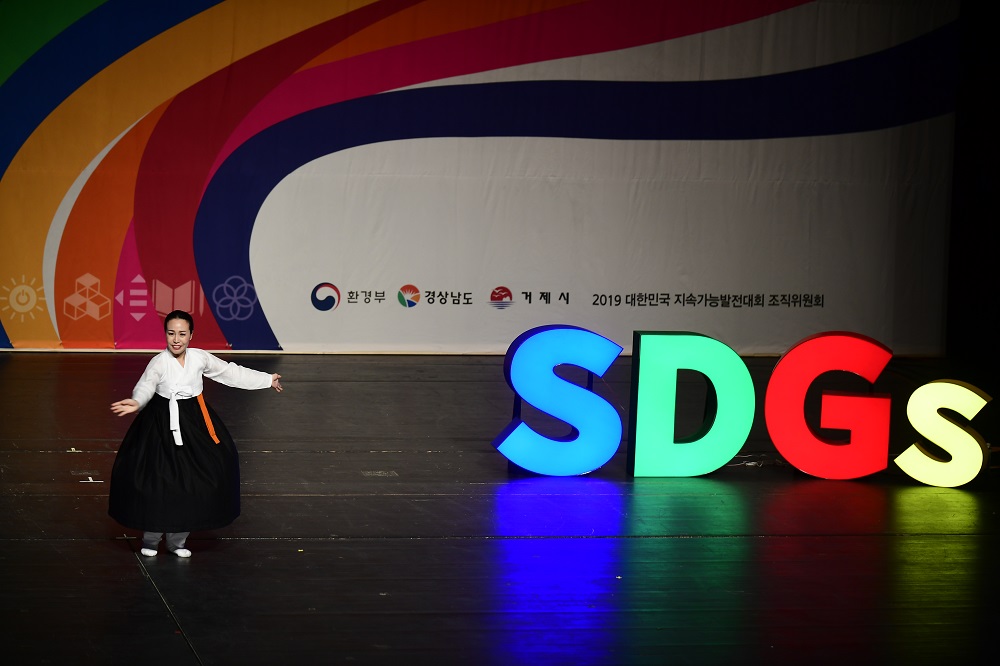
Korean Traditional Dancing on the SDGs floor at 2019 Korea Festival on SD
(Credit: Local Sustainability Alliance of Korea)
Knowledge worth sharing with All
There are plenty of actions for sustainable development implemented locally. Due to the absence of a proper platform for storing and sharing the local knowledge and experience, a lot of local government officers get puzzled when they face the terms of sustainable development or local sustainability. To provide intuitive data and information on the local actions for sustainable development, ICLEI Korea Office launched a shared SDGs map for Korean cities and its dashboard based on Google map & site services. Everyone can access the map and see what sort of efforts are taking place where. The SDGs map and its dashboard is a prototype model with which stakeholders can present advocacy and showcase their actions very quickly and efficiently. We don’t think that every single knowledge is the most valuable and useful to everyone. But we believe if someone, a government officer, student, policymaker, teachers, and whoever gets inspired by single data presented on the map, it has the great potential to change things and situations. ICLEI Korea Office will keep maintaining and updating the platform based on the data collected through ICLEI’s activities and communication with local governments in South Korean as well as the voluntarily shared and reported data from our partners.
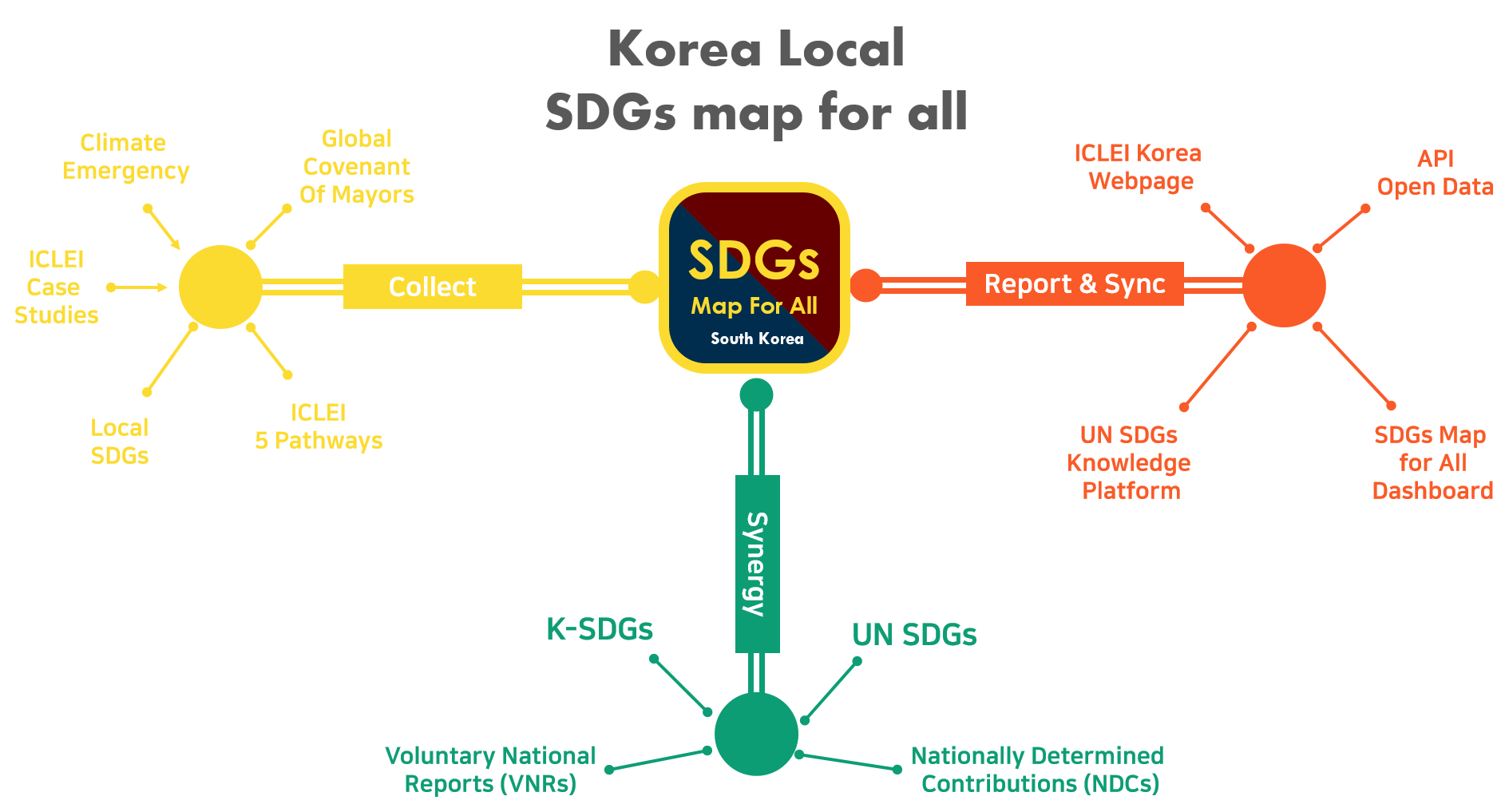
Credit: ICLEI Korea Office
As the ruling Democratic Party of Korea got a dominant position as the result of recent National Assembly elections in April, the idea of implementing a Green New Deal seems to get even more impetus. The Green New Deal is part of a "New Deal" package of current Moon Jae-in administration which includes Digital New Deal and is designed for post COVID19 actions. This sort of comprehensive green project led by the South Korean government is not new. 10 years ago, South Korean government implemented various projects under the national vision of Low Carbon Green Growth, which focused mainly on economic growth through large-scale construction projects. With Green New Deal in the 2020s, the government has more weight on "sustainability" reflecting current global crisis from COVID19 and climate change.
Written & Edited by Jeongmuk Kang, Manager of Policy & Knowledge Management Team, ICLEI Korea Office